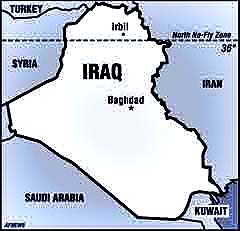Persian Gulf War
Updated February 21, 2017 | Factmonster Staff 

Attack on Iraq
Operation Desert Fox and Operation Northern Watch
 |
December 16, 1998, marked the beginning of four days of air strikes launched against Iraq by the United States and Britain, a consequence of Iraq's continued refusal to cooperate with U.N. arms inspections. Under the 1991 Gulf War cease-fire resolution, a U.N. inspection team was to determine whether Iraq had destroyed its nuclear, biological, and ballistic weapons.
Prelude: A Year of Diplomatic Erosion
After continually thwarting the inspections, Iraq had expelled the American U.N. inspectors in Nov. 1997, and in August 1998 it put a complete halt to the entire U.N. team. Fruitless U.N. negotiations with a defiant Saddam Hussein followed, with the U.S. threatening military action. Finally, when chief U.N. weapons inspector Richard Butler issued a report on Dec. 15 detailing Iraq's bad faith and intransigence, the United States and Britain reached their breaking point. While the U.N. Security Council debated their next step, President Clinton concluded, "Iraq has abused its final chance."
| On Dec. 16, 1998, President Clinton announced, "Iraq has abused its final chance." |
Air Strikes: Dec. 16–19, 1998
The following day Dec. 16, 1998, the United States and Britain began four days of air strikes, which ended on December 19, the day before the Islamic holy month of Ramadan began. The attacks focused on command centers, missile factories, and airfields—targets that the Pentagon believed would damage Iraq's weapons stores.
Desert Fox Not Sly Enough
Operation Desert Fox, as it was called, was an international P.R. disaster for the U.S. and Britain, who were widely condemned by the international community for their belligerence. The lack of U.N. support for the bombing, the proximity of the attack to Ramadan, and the teaming up of the world's only superpower with the former colonial superpower helped to create the perception that Saddam Hussein was less a venal megalomaniac than a victim.
A Stealth War
The U.S and Britain changes tack in response to overwhelming international disapproval of Operation Desert Fox. They abandoned public saber-rattling and began waging a low-profile war of attrition. In Jan. 1999, weekly, sometimes daily, bombings of Iraqi targets within the northern no-fly zone began. The air strikes were incorporated into Operation Northern Watch, a British-U.S. air mission based in Turkey that in 1997 began to monitor the northern no-fly zone.
| Related Links | |
| Iraqi Primer Iraq Saddam Hussein |
Speak Softly, Carry a Big Stick
The U.S miltary's extensive chronology of bombings in 1999 indicates that air strikes have taken place over more than 100 days in 1999, sometimes with several air strikes per day. The U.S. and Britain hope the constant barrage of air strikes will weaken Saddam Hussein's grip on Iraq. Whether their goal can be achieved remains to be seen, but as far as managing to attract almost no attention, it has been spectacularly effective.
Operation Desert Sloth
To the relief of the Clinton and Blair administrations, the year-long bombings have been virtually ignored by the press, particularly during the Kosovo crisis. The New Republic reported in Sept. 1999 that "the Anglo-American war over Iraq does not often make the front pages of even the Iraqi newspapers, let alone those in America." The international community, outraged at Desert Fox—four days of bombing that struck one hundred Iraqi military targets—has remained almost indifferent to Operation Northern Watch—the more than one hundred days of air strikes that have been launched since then. What began as a bang has ended in a whimper, provoking little criticism and much indifference.
Update: The U.S. and Britain continued to bomb Iraq for four years on a regular basis, from Jan. 1999 to the beginning of the war with Iraq on March 19, 2003.
|
See also:
